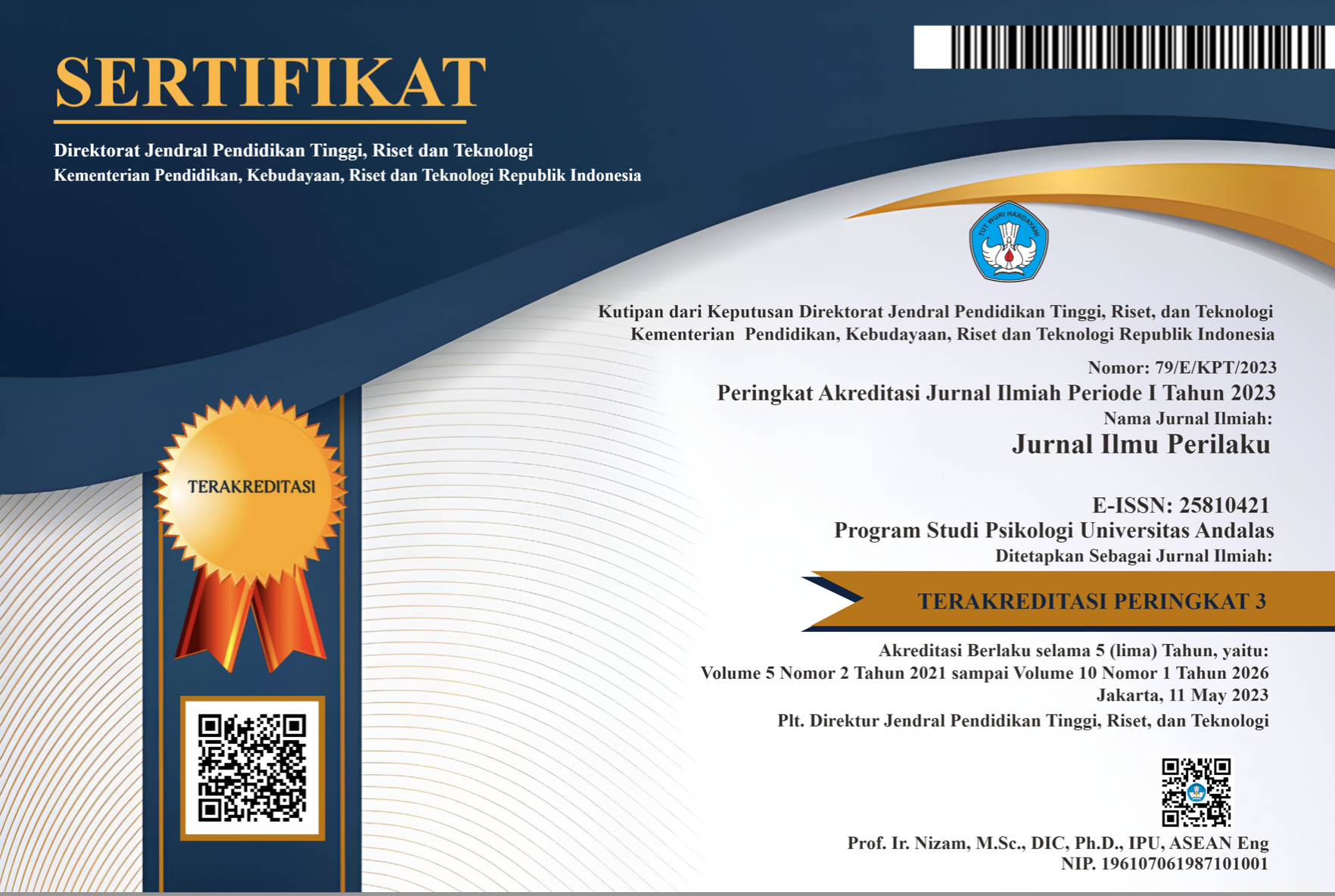Dampak Futsal-Berbasis-Psikologi-Positif pada Anak Usia Sekolah Dasar
Abstract
Penelitian ini bertujuan untuk mengkaji dampak intervensi olahraga futsal yang didesain dengan prinsip psikologi positif: positive emotion, engagement, relationships, meaning, dan accomplishment, yang biasa disingkat sebagai PERMA pada anak siswa sekolah dasar. Sejumlah 22 anak dari kelas I hingga kelas VI sekolah dasar berpartisipasi dalam penelitian ini. Perlakuan olahraga futsal diberikan selama 2 jam per minggu di sore hari sepulang sekolah. Data mengenai PERMA sebelum dan sesudah mengikuti futsal selama 10 kali diperoleh dari pelatih dan guru kelas menggunakan teknik wawancara dan kuesioner. Hasil analisis data menunjukkan adanya peningkatan skor yang sangat signifikan setelah mengikuti kegiatan futsal positif pada semua faktor PERMA. Namun guru kelas dan pelatih tampak memiliki perspektif yang berbeda dalam melihat peningkatan anak. Menurut guru kelas, perubahan yang paling menonjol terletak pada emosi positif dan pemaknaan (meaning). Sedangkan menurut pelatih, perubahan yang paling menonjol pada anak terlihat dalam hal keterlibatan (engagement), pencapaian (accomplishment), dan pemaknaan (meaning). Hasil penelitian ini merekomendasikan kegiatan olahraga futsal positif untuk anak-anak siswa sekolah dasar, terutama yang mengalami problem emosi dan perilaku. Penelitian serupa pada anak perempuan maupun remaja perlu dilakukan.
Downloads
References
Amalia, S., & Ediati, A. (2017). Dampak pelatihan regulasi emosi anak (Remona) terhadap perilaku disruptif pada siswa Kelas I SD Ky Ageng Giri Mranggen Kabupaten Demak. Empati, 6(4), 282–290.
Arif, I. S. (2016). Psikologi positif: Pendekatan saintifik menuju kebahagiaan. Jakarta: PT. Gramedia Pustaka Utama.
Bos, A. E. R., Muris, P., Mulkens, S., & Schaalma, H. P. (2009). Changing self-esteem in children and adolescents: a roadmap for future interventions. Netherlands Journal of Psychology, 62(1), 26–33. https://doi.org/10.1007/bf03061048
Butler, J., & Kern, M. L. (2016). The PERMA-Profiler: A brief multidimensional measure of flourishing. International Journal of Wellbeing, 6(3), 1–48. https://doi.org/10.5502/ijw.v6i3.526
Ediati, A. (2015). Profil problem emosi/perilaku pada remaja SMP-SMA di Kota Semarang. Jurnal Psikologi Undip, 14(2), 190–198. https://doi.org/10.14710/jpu.14.2.190-198
Ediati, A., & Utari, A. (2017). Adolescents’ anxiety in the coastal region of central Java, Indonesia. Advanced Science Letters, 23(4). https://doi.org/10.1166/asl.2017.9129
Friedrich, B., & Mason, O. J. (2017). “What is the score?” A review of football-based public mental health interventions. Journal of Public Mental Health, 16(4), 144–158. https://doi.org/10.1108/JPMH-03-2017-0011
Friedrich, B., & Mason, O. J. (2018). Applying Positive Psychology Principles to Soccer Interventions for People with Mental Health Difficulties. Psychology, 09(03), 372–384. https://doi.org/10.4236/psych.2018.93023
Funk, M., Drew, N., Knapp, M., & Knapp, M. (2012). Mental health, poverty and development. Journal of Public Mental Health, 11(4), 166–185. https://doi.org/10.1108/17465721211289356
Gould, D., Collins, K., Lauer, L., & Chung, Y. (2007). Coaching life skills through football: A study of award winning high school coaches. Journal of Applied Sport Psychology, 19(1), 16–37. https://doi.org/10.1080/10413200601113786
Holt, N. L., Kingsley, B. C., Tink, L. N., & Scherer, J. (2011). Benefits and challenges associated with sport participation by children and parents from low-income families. Psychology of Sport & Exercise, 12(5), 490–499. https://doi.org/10.1016/j.psychsport.2011.05.007
Johnson, S. R., Pas, E. T., & Bradshaw, C. P. (2016). Understanding and measuring coach-teacher alliance: A glimpse inside the “black box.” Prevention Science, 17(4), 439–449. https://doi.org/10.1007/s11121-0160633-8.UnderstandingJones, A. (2009). Football as a metaphor: Learning to cope with life, manage emotional illness, and maintain health through to recovery. Journal of Psychiatric and Mental Health Nursing, 16, 488–492.
Kern, M. L., Waters, L. E., Adler, A., White, M. A., Kern, M. L., Waters, L. E.,White, M.A. (2015). A multidimensional approach to measuring well-being in students: Application of the PERMA framework. The Journal of Positive Psychology, 9760, 1–10. https://doi.org/10.1080/17439760.2014.936962
Knight, C. J., Berrow, S. R., & Harwood, C. G. (2017). Parenting in sports. Current Opinion in Psychology, 16, 93–97. https://doi.org/10.1016/j.copsyc.2017.03.011
Machado, A. A., Bezerra, I. S., Ponciano, K. R., Rica, R. L., Gama, E. F., Junior, A. F.,Bocalini, D. S. (2018). Futsal as a strategy for the improvement of elementary abilities and the development of the body image in children. Motricidade, 14(2–3), 11–19. https://doi.org/10.6063/motricidade.12299
Marquis, W. A., & Baker, B. L. (2015). Sports participation of children with or without developmental delay: Prediction from child and family factors. Research in Developmental Disabilities, 37, 45–54. https://doi.org/10.1016/j.ridd.2014.10.028
Quinn, R., & Carr, D. (2013). Developmentally Appropriate Soccer Activities for Elementary School Children. Journal of Physical Education, Recreation & Dance, 77(5), 13–17. https://doi.org/10.1080/07303084.2006.10597872
Rettew, D. C., Satz, I., & Joshi, S. V. (2018). Teaching well-being from kindergarten to child psychiatry fellowship programs. Child and Adolescent Psychiatry Clinics of North America, 1–14. https://doi.org/10.1016/j.chc.2018.11.007
Seligman, M. E. P., Ernst, R. M., Gillham, J., Reivich, K., & Linkins, M. (2009). Positive education: Positive psychology and classroom interventions. Oxford Review of Education, 35(3), 293–311. https://doi.org/10.1080/03054980902934563
Seligman, M., & Seligman, M.(2018). PERMA and the building blocks of well-being PERMA and the building blocks of well-being. The Journal of Positive Psychology, 9760, 1–3. https://doi.org/10.1080/17439760.2018.1437466
Thelwell, R. C., Greenlees, I. A., & Weston, N. J. V. (2006). Using psychological skills training to develop soccer performance. Journal of Applied Sport Psychology, 18(3), 254–270. https://doi.org/10.1080/10413200600830323
Vella, S. A., Cliff, D. P., Magee, C. A., & Okely, A. D. (2014). Sports Participation and Parent-Reported Health-Related Quality of Life in Children: Longitudinal Associations. The Journal of Pediatrics, 164(6), 1469–1474. https://doi.org/10.1016/j.jpeds.2014.01.071
Waters, L. (2011). A Review of School-Based Positive Psychology Interventions. The Australian Educational and Developmental Psychologist, 28(2), 75–90. https://doi.org/10.1375/aedp.28.2.75
Wahyuni, M. (2017). Pengaruh makna kerja dan occupational self efficacy terhadap work engagement pada dosen tetap. Jurnal Psikologi, 10(1), 39-47.
Wanjiku, K. P. (2016). Effect of intrinsic rewards on the commitment of employees at Kenya’s Fairmont Group of hotels. (Unpublished thesis). The University of Nairobi.
Widyastuti, E., & Nugroho, Y. J. D. (2017). Komitmen organisasi ditinjau dari kepuasan kerja dan makna kerja. Jurnal Ilmiah Psikohumanika, 9(1), 37-49.
The non-commercial use of the article is governed by the Creative Commons Attribution license as currently displayed on Creative Commons Attribution-NonCommercial-ShareAlike 4.0 International License.
JIP's spirit is to disseminate articles published are as free as possible. Under the Creative Commons license, JIP permits users to copy, distribute, display, and perform the work for non-commercial purposes only. Users will also need to attribute authors and JIP on distributing works in the journal.
Please find the rights and licenses in Jurnal Ilmu Perilaku (JIP).
- License
The non-commercial use of the article will be governed by the Creative Commons Attribution license as currently displayed on Creative Commons Attribution-NonCommercial-ShareAlike 4.0 International License.
- Author’s Warranties
The author warrants that the article is original, written by stated author(s), has not been published before, contains no unlawful statements, does not infringe the rights of others, is subject to copyright that is vested exclusively in the author and free of any third party rights, and that any necessary written permissions to quote from other sources have been obtained by the author(s).
- User Rights
JIP's spirit is to disseminate articles published are as free as possible. Under the Creative Commons license, JIP permits users to copy, distribute, display, and perform the work for non-commercial purposes only. Users will also need to attribute authors and JIP on distributing works in the journal.
- Rights of Authors
Authors retain the following rights:
- Copyright, and other proprietary rights relating to the article, such as patent rights,
- The right to use the substance of the article in future own works, including lectures and books,
- The right to reproduce the article for own purposes, provided the copies are not offered for sale,
- The right to self-archive the article.
- Co-Authorship
If the article was jointly prepared by other authors, the signatory of this form warrants that he/she has been authorized by all co-authors to sign this agreement on their behalf, and agrees to inform his/her co-authors of the terms of this agreement.
- Termination
This agreement can be terminated by the author or JIP upon two months’ notice where the other party has materially breached this agreement and failed to remedy such breach within a month of being given the terminating party’s notice requesting such breach to be remedied. No breach or violation of this agreement will cause this agreement or any license granted in it to terminate automatically or affect the definition of JIP.
- Royalties
This agreement entitles the author to no royalties or other fees. To such extent as legally permissible, the author waives his or her right to collect royalties relative to the article in respect of any use of the article by JIP or its sublicensee.
- Miscellaneous
JIP will publish the article (or have it published) in the journal if the article’s editorial process is successfully completed and JIP or its sublicensee has become obligated to have the article published. JIP may conform the article to a style of punctuation, spelling, capitalization, referencing and usage that it deems appropriate. The author acknowledges that the article may be published so that it will be publicly accessible and such access will be free of charge for the readers.










